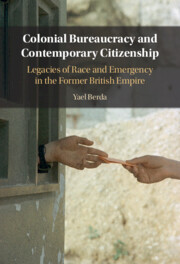Crossref Citations
This Book has been
cited by the following publications. This list is generated based on data provided by Crossref.
Cheong, Amanda R.
2023.
Theorizing Omission: State Strategies for Withholding Official Recognition of Personhood.
Sociological Theory,
Vol. 41,
Issue. 4,
p.
377.
Bishara, Amahl A.
2023.
Publics, Polls, Protest: Public Representation as Sociopolitical Practice.
Annual Review of Anthropology,
Vol. 52,
Issue. 1,
p.
437.
2024.
Soldier’s Paradise.
p.
123.
2024.
Soldier’s Paradise.
p.
167.
Bhat, M. Mohsin Alam
2024.
(Un)Credible Citizen: Citizenship Dispossession, Documents and the Politics of the Rule of Law.
SSRN Electronic Journal,
Sadiq, Kamal
and
Tsourapas, Gerasimos
2024.
Labour coercion and commodification: from the British Empire to postcolonial migration states.
Journal of Ethnic and Migration Studies,
Vol. 50,
Issue. 3,
p.
617.
2024.
Soldier’s Paradise.
p.
101.
Frenkel, Michal
2024.
The October 2023 War—From a Colonial to an Imperial Analysis.
Palestine/Israel Review,
Vol. 1,
Issue. 1,
p.
249.
Cheong, Amanda R
2024.
Racial Exclusion by Bureaucratic Omission: Non-Enumeration, Documentary Dispossession, and the Rohingya Crisis in Myanmar.
Social Problems,
2024.
Soldier’s Paradise.
p.
65.
2024.
Soldier’s Paradise.
p.
249.
Bhat, Mohsin Alam
2024.
(Un)Credible citizen: citizenship dispossession, documents and the politics of the rule of law.
Journal of Ethnic and Migration Studies,
Vol. 50,
Issue. 19,
p.
4867.
2024.
Soldier’s Paradise.
p.
209.
Rhoads, Elizabeth L.
and
Das, Ritanjan
2024.
The Specter of Potential Foreigners: Revisiting the Postcolonial Citizenship Regimes of Myanmar and India.
Critical Asian Studies,
Vol. 56,
Issue. 2,
p.
155.
2024.
Soldier’s Paradise.
p.
143.
2024.
Soldier’s Paradise.
p.
37.
2024.
Soldier’s Paradise.
p.
1.
Bhat, Mohsin Alam
and
Shahid, Rudabeh
2024.
Introduction: mutual attrition of citizenship, democracy and the rule of law in South and Southeast Asia.
Journal of Ethnic and Migration Studies,
Vol. 50,
Issue. 19,
p.
4787.
2024.
Soldier’s Paradise.
p.
189.
Ben-Yehoyada, Naor
2025.
Criminalization on trial.
HAU: Journal of Ethnographic Theory,
Vol. 15,
Issue. 1,
p.
186.



